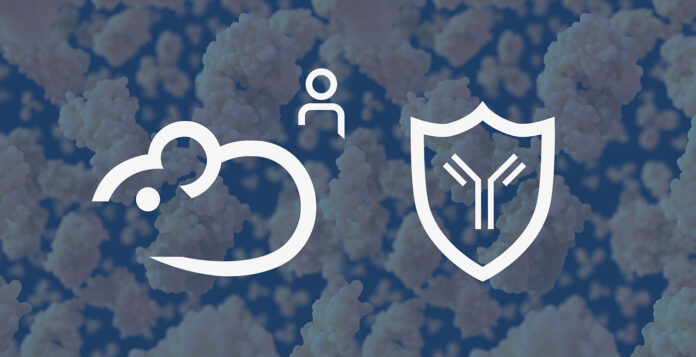Sponsored content brought to you by
Vaccines are pivotal tools in cancer and infectious disease research, offering potent prophylactic and therapeutic approaches. Therapeutic vaccines for cancer aim to stimulate the patient’s immune system to recognize and destroy cancer cells. Preventive vaccines against infectious pathogens have historically been instrumental in controlling and eradicating diseases, reducing morbidity and mortality worldwide.
Given diverse immune responses across the population, comprehensive evaluation of vaccine candidates is essential to ensure therapeutic efficacy and safety. This evaluation heavily relies on preclinical models. Among these models, immune humanized mice have emerged as promising in vivo tools due to their ability to mimic human immune responses more closely than conventional animal models. This article explores the advantages offered by humanized mice in vaccine research.
Recapitulate human pathophysiology
Human infectious diseases often rely on species specificity for entry, replication, and pathogenesis. Conventional mouse models, and to a lesser extent nonhuman primates, may not fully support infection and replication of native human pathogens. Conversely, CD34+ hematopoietic stem cell (HSC) or peripheral blood mononuclear cell (PBMC) humanized mice provide an environment conducive to infection and viral replication, expressing requisite host cells, proteins, and conditions. Humanized NSG and variants can effectively support infection and recapitulate patient-observed pathogenesis caused by various viruses, bacteria, fungi, and protozoa pathogens.1 Moreover, the overlapping profiles of cellular, humoral, and transcriptomic immunity observed in immune humanized mice and human vaccinees to the yellow fever virus vaccine YFV-17D underscore the value of these mice for evaluating vaccine efficacy.2
The life-threatening Phase-1 clinical trial failure of TGN14123 emphasizes the need to evaluate safety and efficacy in models with clinically accurate representation of the tumor microenvironment. Immune humanized NSG variants, co-engrafted with allogenic or autologous patient-derived xenografts (PDXs) or cell–line derived xenografts, referred to as Onco-Hu mice, offer a platform for such evaluation. Notably, a recent publication utilizing PBMC tumor-bearing NSG mice demonstrated the potential dual utility of antipathogen vaccines for both infection prevention and cancer immunotherapy.4
JAX has an extensive, well-characterized PDX database encompassing solid and liquid tumors featuring diverse patient configurations.
Enable personalized medicine
Vaccine efficacy depends on antigen presentation and activation of the patient’s immune system. Individuals with chronic infectious diseases or cancers often exhibit dampened immunity. Using “healthy” preclinical models may not accurately reflect the efficacy in immune-suppressed individuals. NSG variants, reconstituted with patient-specific immune systems, offer a promising solution to enhanced predictability and a personalized medicine approach to vaccine development.
Tumor heterogeneity, compounded by the presence of hot and cold tumors, poses significant challenges to cancer vaccine development. Avatar mice, engrafted with a patient’s immune system and an autologous PDX, offer a potentially invaluable platform for predicting a patient’s response to treatment and identifying tumor neoantigens.
Identify responsive and nonresponsive responders
The immune cell environment heavily influences vaccine efficacy. Host factors like age, sex, genetics, and immune history influence vaccine efficacy, suggesting a universal approach may not suffice, especially for high-risk groups. There’s a need to stratify the population based on their responsiveness to different vaccines to improve efficacy.
JAX maintains an extensive database of both HSC and PBMC donors for engraftment in NSG variants. Evaluating vaccines in humanized mice engrafted with diverse donors can unveil prevaccination baseline predictors. These predictors can guide vaccination strategies, leading to more effective interventions for specific populations. Additionally, they could shed light on whether modulating immune characteristics before vaccination could enhance efficacy.
JAX has a diverse portfolio of models for vaccine research
Developing effective vaccines remains paramount in the quest to combat infectious diseases, develop cures for cancer, and improve public health. While not without limitations, humanized mice are helping to bridge the preclinical-clinical gap to developing more efficacious and safe vaccines. We are continually developing new NSG variants to support varying ratios of immune populations and HLA-restricted variants for vaccine studies.
References available online.
- resources.jax.org/white-papers/whitepaper-infectious-disease
- Douam F, et al. Selective expansion of myeloid and NK cells in humanized mice yields human-like vaccine responses. Nat Commun. 2018 Nov 28;9(1):5031. doi: 10.1038/s41467-018-07478-2. PMID: 30487575; PMCID: PMC6262001.
- Suntharalingam G, Perry MR, Ward S, Brett SJ, Castello-Cortes A, Brunner MD, Panoskaltsis N. Cytokine storm in a phase 1 trial of the anti-CD28 monoclonal antibody TGN1412. N Engl J Med. 2006 Sep 7;355(10):1018-28. doi: 10.1056/NEJMoa063842. Epub 2006 Aug 14. PMID: 16908486.
- doi.org/10.1073/pnas.1904022116

Explore JAX’s full portfolio of oncology platforms and services www.jax.org.




